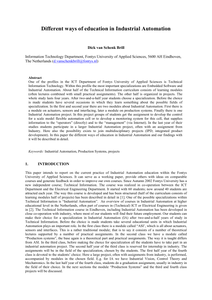Within the profile Technical Information Technology (ICT Department) the most important specializations are Embedded Software and Industrial Automation. About half of the Technical Information curriculum consists of learning modules, the other half is organized in projects. The whole study lasts four years. After two-and-a-half year students choose a specialization. Before the choice is made students have several occasions in which they learn something about the possible fields of specialization. In the first and second year there are two modules about Industrial Automation. First there is a module on actuators, sensors and interfacing, later a module on production systems. Finally there is an Industrial Automation project. In this project groups of students get the assignment to develop the control for a scale model flexible automation cell or to develop a monitoring system for this cell. In the last year of their studies students participate in a larger Industrial Automation project, often with an assignment from Industry. Here also the possibility exists to join multidisciplinary projects (IPD; integrated product development).
DOCUMENT

Purpose: The purpose of this paper is to inform the reader of some emerging trends in placemaking and digital destination management, while providing a conceptual background on shifts in architectural design. Design/methodology/approach: The trend paper is based on a fundamental bibliographic view on evolutions in placemaking, from architectural design to spatial agency, integrated by and contextualized in tourism trends, however possibly anecdotal. Findings: The trend paper identifies a fundamental shift from architectural processes to spatial agency as organizing principle for placemaking, discussing how digital tourism trends are formed or forming change in this. Originality/value: The trend paper newly relates otherwise distant and unrelated fields, namely architectural design theory and tourism trends, by connecting at the level of IoT and IT digital technologies, exploring the impact and the mutual role played by its two constituencies.
DOCUMENT

The project STORE&GO aims to investigate all the aspects regarding the integration of large-scale Power-to-Gas (PtG) at European level, by exploiting it as means for long term storage. One of the aspects that should be properly addressed is the beneficial impact that the integration of PtG plants may have on the electricity system.In the project framework, WP6 devoted its activities to investigate different aspects of the integration of PtG in the electricity grid, with the previous delivered reports.This deliverable focused in particular on how integrate the information about the facilities replicating the real world condition into a simulation environment. For doing this, the concept of remote Physical Hardware-in-the-Loop (PHIL) has been used and exploit.Remote simulation with physical hardware appears to be an effective means for investigating new technologies for energy transition, with the purpose of solving the issues related to the introduction of new Renewable Energy Sources (RES) into the electricity system. These solutions are making the overall energy systems to be investigated much more complex than the traditional ones, introducingnew challenges to the research. In fact:• the newly integrated technologies deal with different energy vectors and sectors, thus• requiring interoperability and multidisciplinary analysis;• the systems to be implemented often are large-scale energy systems leading to enormously complicated simulation models;• the facilities for carrying out the experiments require huge investments as well as suitable areas where to be properly installed.This may lead to the fact that a single laboratory with limited expertise, hardware/software facilities and available data has not the ability to secure satisfactory outcomes. The solution is the share of existing research infrastructures, by virtually joining different distant laboratories or facilities.This results in improvement of simulation capabilities for large-scale systems by decoupling into subsystems to be run on distant targets avoidance of replication of already existing facilities by exploiting remote hardware in the loop concept for testing of remote devices.Also confidential information of one lab, whose sharing may be either not allowed or requiring long administrative authorization procedures, can be kept confidential by simulating models locally and exchanging with the partners only proper data and simulation results through the co-simulation medium.Thanks to the realized method it is possible to real time analyse renewable devices at remotepower plants and place them in the loop of a local network simulation.The results reported show that the architecture developed is strong enough for being applied also atnew renewable power plants. This opens the possibility to use the data for research purposed, butalso to act in remote on the infrastructure in case of particular test (for example the acceptance test).
DOCUMENT